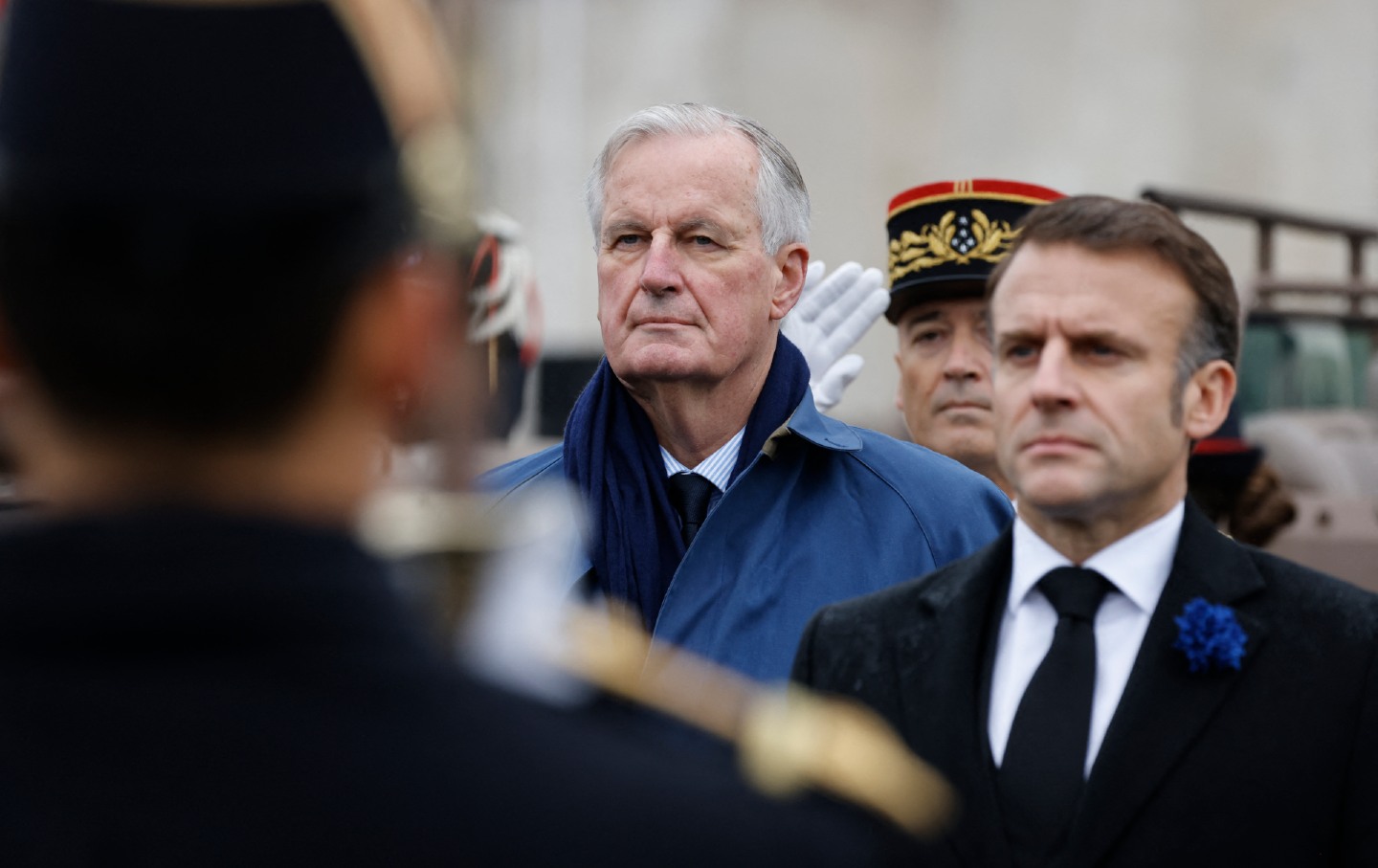Biden’s Israel Policies Are Still on the Wrong Track
The president is clinging to his long record of a bellicose approach to foreign relations—even as public opinion is going the other way.

President Joe Biden speaks at a Hanukkah reception in the East Room of the White House in Washington, Monday, December 11, 2023.
(Jacquelyn Martin / AP Photo / Pool)It was no great surprise that President Joe Biden went off-script during his remarks at a campaign event commemorating the Jewish holiday of Hanukkah last week. Nor was it surprising that he addressed the Israel-Gaza war, and the prospects for pausing the Netanyahu government’s brutal, irredentist bombing campaign. As expected, Biden continued stressing the tight coordination of Israel’s conduct of the war and the US national security state.
What was a bit astonishing, though, was Biden’s riff on trains. Amtrak’s best-known regular customer explained how he got a recent global trade summit to endorse a new cross-regional train installation—and then spelled out how the project would help call the great will-o’-the-wisp in a half-century’s worth of Middle East peace negotiations, a Palestinian state, into being. The reasoning went as follows:
At the G20 meeting with all the 20 major nations in the world, I got a resolution passed that no one thought could happen, saying we’re going to build a railroad from the middle of India all the way up to England and a pipeline across the Mediterranean to unite the countries. And the train is going to go—literally, not figuratively—from—from India into Saudi Arabia, Saudi Arabia into—to Jordan, Jordan to Israel, Israel, et cetera.
Because there—we have an opportunity to begin to unite the region—unite the region. And they still want to do it. But we have to make sure that—that Bibi understands that he’s got to make some moves to strengthen
PLA[PA]—strengthen it, change it, move it. You cannot say there’s no Palestinian state at all in the future. And that’s going to be the hard part.
Biden went on to call out Netanyahu for Israel’s “indiscriminate” bombing campaign in Gaza, and warned that it was costing the Jewish state critical worldwide support in the wake of the horrific October 7 terror campaign that Hamas launched against Israeli civilians. These were welcome, if far too incremental, developments for a Biden White House that’s repeatedly stressed that it is not seeking to impose “red lines” of any sort on Israel’s campaign of mass death among Palestinian civilian populations, even as it’s done precious little to eradicate or displace Hamas operations.
But the train saga was revealing, since among other things, it showed how Biden remains wedded to a framework of negotiation that’s largely irrelevant to the conflict in the Middle East. Just for starters, it’s hard to puzzle out how a transportation deal is supposed to induce Israel to suspend a war that’s already targeting critical infrastructure, such as schools, hospitals, agriculture, and the Gazan judicial complex—let alone to empower a Palestinian state to hypothetically partner with Israel on such a project. For decades, peace advocates in the Middle East had stressed that the two parties needed to reach a two-state accord in order to secure long-term access to water; if the prospect of relinquishing water rights wasn’t enough of an incentive for a power-sharing peace deal, railroad access isn’t going to do the trick.
Then there’s the fallacy that large commercial incentives, by themselves, can produce mystic diplomatic consensus; that was, indeed, the chief selling point for the Trump administration’s ludicrously off-topic Abraham Accords, which used trade deals among Israel and the region’s Arab states as the basis for yet another hypothetical future peace deal. Instead, Israel took the normalization clauses of the accords as a rationale to continue ignoring the ruinous power dynamics of the occupation in Gaza and the West Bank; Biden’s White House was touting a successor deal with Saudi Arabia and israel on the same premises just days prior to the October 7 Hamas attacks.
Clinging to a peace-promoting vision of regional commerce in such conditions is more than the fond reverie of an aging train enthusiast; it’s of a piece with Biden’s larger failure to reckon with the dramatically altered playing field in the Middle East. In the Senate, Biden was chair of the Senate Foreign Relations Committee through most of the aughts, as the Bush White House sought to transform the region in America’s preferred image, via the Iraq War’s bomb-driven campaign for “democratization” and a broad series of trade incentives. Biden initially was a key congressional supporter of the 2003 invasion of Iraq, before staking out a position as a critic of the war’s conduct. This was largely the pattern that had shaped his foreign-policy portfolio going back to the beginning of his national political career, when he opposed the course of the Vietnam War under Richard Nixon, but derided anti-war protestors as “assholes.” As The Intercept’s Jeremy Scahill writes, “As the consummate insider of the foreign policy establishment, Biden has been inclined to tinker around the edges, offering caveats and constraints, rather than directly confronting and opposing the drumbeat for war—an approach that ultimately smoothed the path for wars to happen.”
Biden’s close alliance with Israel has been another lodestar of his work in foreign policy. During Israel’s 1982 war with Lebanon, he gave an impassioned speech from his perch on the foreign relations committee supporting the country’s bombing offensive, which was then drawing criticism as another disproportionate use of force. Indeed, Biden went so far as to claim that women and children would be legitimate targets in Israel’s campaign for greater security—a sentiment actually disowned by then–Prime Minister Menachem Begin, who was appearing before the committee. Begin later told a group of Israeli reporters:
“I said to him: ‘No, sir; attention must be paid. According to our values, it is forbidden to hurt women and children, even in war.… Sometimes there are casualties among the civilian population as well. But it is forbidden to aspire to this. This is a yardstick of human civilization, not to hurt civilians.’”
Biden’s been forced to at least rhetorically walk back some elements of his administration’s initial blank-check endorsement of Israel’s conduct in the Gaza war amid mounting popular opposition. But Biden associates have noted that such concessions have been grudging—and, more disturbingly, that they bespeak a seeming unwillingness to reckon with the extremist makeup of the Netanyahu government. “The president’s personal historical commitment to Israel was not modulated by the reality that this Israel happens to have a government that is the worst government it’s ever had,” one Biden ally told The Washington Post. “Biden has underestimated the degree to which you have to separate how Israel reacts to this and how a Netanyahu government reacts to this.”
Indeed, even as he made an initial show of criticizing Netanyahu’s prosecution of the Gaza war, Biden also boasted of his 50-year friendship with the Israeli prime minister, pointing out that he displays a framed photo of Biden on his desk. Biden also stressed his firm ideological support for Israel, claiming, “Were there not an Israel, we’d have to invent one—we’d have to invent one. I believe, without Israel as a freestanding state, not a Jew in the world is safe.” Biden accordingly sought to deflect blame for the inhumane bombing campaign onto Public Security Minister Itamar Ben Gvir, who’s not even a member of Netanyahu’s emergency war cabinet, as though he had somehow gone rogue—and as though the sustained assault on Gaza civilians weren’t the main thing keeping Netanyahu’s political career going.
It was thus no great shock that, the day after Biden delivered his remarks, an administration official walked them back, telling CNN that the White House’s policy hadn’t changed: The president had “no plans to shift [the White House’s] position and draw any red lines around the transfer of weapons and munitions to Israel.” Meanwhile, in an interview with Sky News, Tzipi Hotovely, Israel’s ambassador to the UK, echoed the oft-reiterated position of the Netanyahu government on whether the Palestinians should have a state: “Absolutely not.” (Netanyahu also said as much in his response to Biden’s plea to revive the Palestinian Authority.) After Biden’s gentle murmur of dissent, in other words, the dismal, failed status quo locked firmly back into gear. By week’s end, the White House was floating a plan for Israel to wind down the Gaza ground war by the end of the year, and initiate a phase of commando raids more narrowly targeting Hamas operations—a move that met with predictable Israeli resistance while also raising the awkward question of why the United States hadn’t urged a more Hamas-centric military campaign in the first place.
The latest stirring of lackluster resistance from the Biden White House seems on course, in short, to restore everything back to the same unworkable factory settings, circa Biden’s congressional heyday. Which is largely why, in refusing to wield the United States’ formidable influence in Israel, and failing to recognize the actual political conditions on the ground, Biden is left touting a magical infrastructure fix in the vein of a classic Simpsons episode. The American president can press the moral and pragmatic case to resume two-state negotiations all he wants, but in reality, that train left the station long ago.








